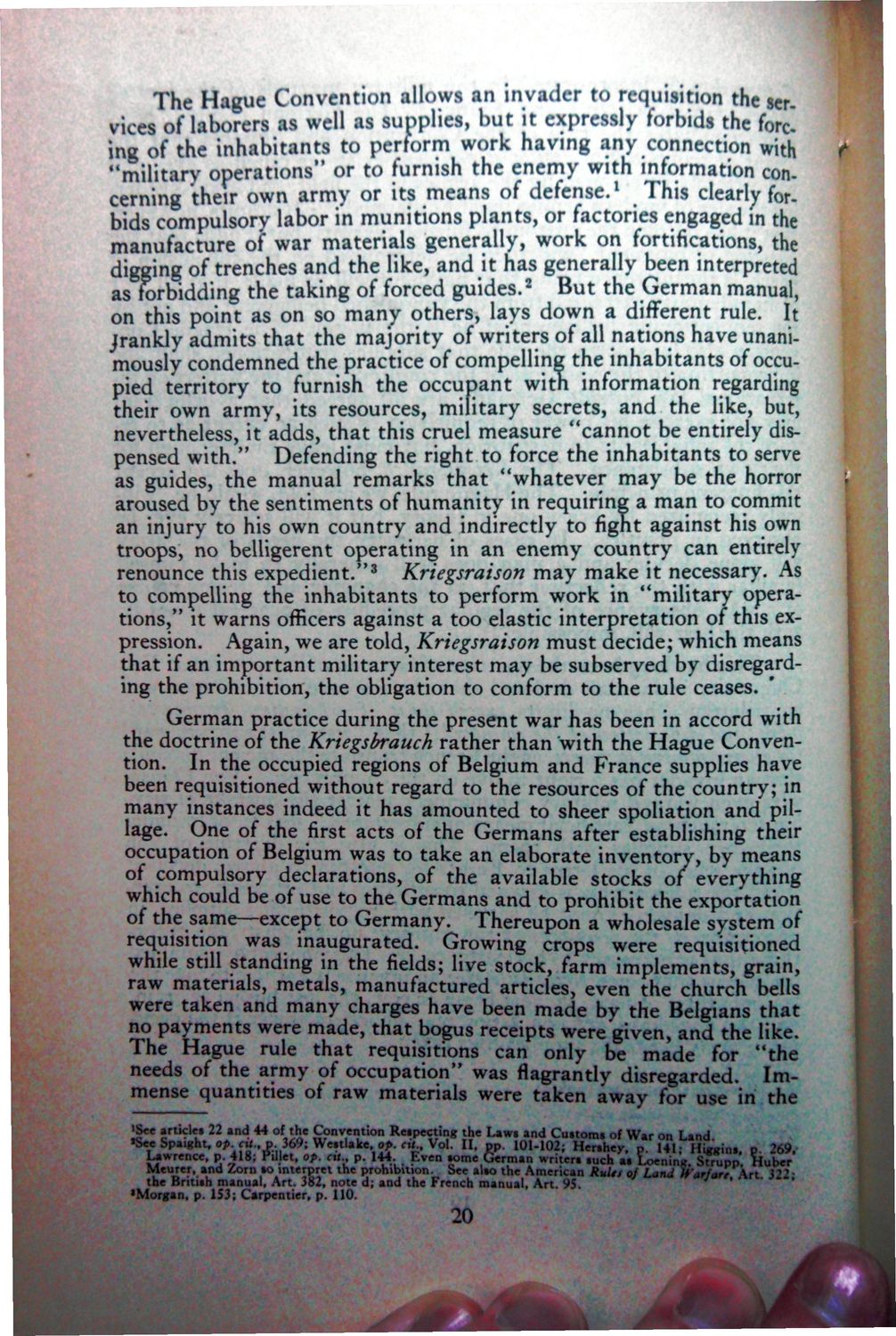| |
| |
Caption: War Publications - WWI Compilation 1923 - Article 14
This is a reduced-resolution page image for fast online browsing.

EXTRACTED TEXT FROM PAGE:
The Hague Convention allows an invader to requisition the services of laborers as well as supplies, but it expressly forbids the fore, ing of the inhabitants to perform work having any connection with •'military operations" or to furnish the enemy with information con1 cerning their own army or its means of defense- This clearly for. bids compulsory labor in munitions plants, or factories engaged in the manufacture of war materials generally, work on fortifications, the digging of trenches and the like, and it has generally been interpreted 2 as forbidding the taking of forced guides. But the German manual, on this point as on so many others, lays down a different rule. It Jrankly admits that the majority of writers of all nations have unanimously condemned the practice of compelling the inhabitants of occupied territory to furnish the occupant with information regarding their own army, its resources, military secrets, and the like, but, nevertheless, it adds, that this cruel measure "cannot be entirely dispensed with." Defending the right to force the inhabitants to serve as guides, the manual remarks that "whatever may be the horror aroused by the sentiments of humanity in requiring a man to commit an injury to his own country and indirectly to fight against his own troops, no belligerent operating in an enemy country can entirely 3 renounce this expedient/' Kriegsraison may make it necessary. As to compelling the inhabitants to perform work in "military operations," it warns officers against a too elastic interpretation of this expression. Again, we are told, Kriegsraison must decide; which means that if an important military interest may be subserved by disregarding the prohibition, the obligation to conform to the rule ceases. German practice during the present war has been in accord with the doctrine of the Kriegsbrauch rather than with the Hague Convention. In the occupied regions of Belgium and France supplies have try poli occupation of Belgium was to take an elaborate inventory, by means of compulsory declarations, of the available stocks of everything which could be of use to the Germans and to prohibit the exportation of the same—except to Germany. Thereupon a wholesale system of requisition was inaugurated. Growing crops were requisitioned while still standing in the fields; live stock, farm implements, grain, raw materials, metals, manufactured articles, even the church bells were taken and many charges have been made by the Belgians that no payments were made, that bogus receipts were given, and the like. The Hague rule that requisitions can only be made for "the needs of the army of occupation" was flagrantly disregarded. Immense quantities of raw materials were taken away for use in the •Sec articles 22 and 44 of the Convention Respecting the Laws and Customs of War on Land 'See Spaight, op cu.. p,369; We.tlake op cit Vol. II. np. 101-102; Her.hey, n. 141; Higgtnt, p. 269. Lawrence, p. 418; Pillet, op. cu p. 144 Even some German writers such as Loening. Strupp. Huber Meurer, and Zorn so interpret the prohibition Sec also the American Rule, of Land Warfare! Art. 322: the British manual, Art. 382, note d; and the French manual. Art. 95. 'Morgan, p. 153; Carpentier, p. 110. 20
| |